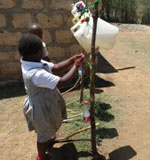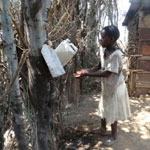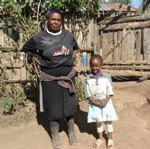Learn at School, Practice at Home
Learn at School, Practice at Home: Early Childhood Development Centers Reinvigorate Improved Hygiene Practices - February 2014.
Schools often provide models for desired behaviors that we hope children will bring back home. While implementing a community-led total sanitation effort in Maai Mahu division, Kenya, the WASHplus project found that young children in early childhood development (ECD) centers were openly defecating at school. This was discovered during an open defecation free (ODF) verification process—the first level of verification conducted by the district public health officer’s team following an ODF claim by a village. Nine villages claimed ODF status at the time, and two did not qualify because verifiers found feces in the grass near the ECD center. When they explored this further, community health workers found that children used a latrine at home, but not at school. Why was this happening? 
After conversations with community leaders and ECD teachers it became clear that teachers were not aware of the importance of hygiene to prevent illness. Children were only allowed to visit the latrine during scheduled breaks. And with large classes, not all children had time to visit the latrine, so they were going to the bush.
WASHplus noted these practices and offered a one-day WASH (water, sanitation, and hygiene) training for ECD teachers from 21 centers in Maai Mahu division. The participants immediately incorporated what they learned into the curriculum and their daily practice. The following stories illustrate these efforts.
A Teacher’s Quest for a Disease-Free Community
Loud harmonized voices of children singing or reciting poems greet you as you approach Snider Early Childhood Development Center, a preschool in Naruiru village. Although she is the only teacher for the 70 children at the school, Rebecca Githuthwa manages to make learning fun and has become a hygiene and sanitation champion in the school and the surrounding village.
In the last three months, she has gone the extra mile to promote good sanitation, thanks to knowledge and skills learned at the WASHplus training. She has shared what she learned with parents. This ensured that the practices in school such as treating drinking water and hand washing were replicated at home. “I was impressed by the number of parents who showed up during the meeting and the interest they showed in ensuring it became a success,” says Ms. Githuthwa.
After a week of practice, pupils mastered the vital procedures of proper toilet use and hand washing. “Before the practice began we used to record cases of hygienic-related illnesses with the pupils,” says the teacher. “This was affecting their learning patterns because some would be absent from school for as long as a week.”
 Ms. Githuthwa did not stop there. She ventured out into the entire village, preaching the importance of hygiene. Many members of the community heeded her call and are enjoying the benefits of good hygiene. One such beneficiary is the family of Rose Njoki, a 12-year-old Class Seven pupil at Maai Mahiu Primary School whose home is just few meters away from the ECD center. Ms. Githuthwa helped the family install a simple hand washing station, and they now treat their drinking water by boiling it. They also keep their toilet clean.
Ms. Githuthwa did not stop there. She ventured out into the entire village, preaching the importance of hygiene. Many members of the community heeded her call and are enjoying the benefits of good hygiene. One such beneficiary is the family of Rose Njoki, a 12-year-old Class Seven pupil at Maai Mahiu Primary School whose home is just few meters away from the ECD center. Ms. Githuthwa helped the family install a simple hand washing station, and they now treat their drinking water by boiling it. They also keep their toilet clean.
“We were told by the teacher that if we don’t wash our hands with soap we will get sick with diseases such as typhoid and cholera,” says Rose. “We made our own tippy tap [hand washing station] together with my elder sister.”
The community response has been encouraging. “In the seminar we were shown how much dirt we were eating. But since then, we have seen great change in school now,” says Ms. Githuthwa. Previously about five children a week were sick with hygiene-related illness. Now some weeks pass without any child falling sick. The children’s teacher attributes this reduction to the new hygiene practices.
Wisdom of Babes: Teachers Work with Children to Promote Good Hygiene
The joy of every mother is to see her child grow healthier each passing day. Like all mothers, Beth Wairimu got very worried whenever her little girl, and only daughter, fell sick with diarrhea. She recalls the frantic visits she made to the local dispensary to seek treatment for her five-year-old. The doctors would blame her sickness on poor hygiene. Mary often missed many days of school.
Today, things are different. Mary rarely falls ill with diarrhea, thanks to knowledge her teachers and mother gained from WASHplus training. While the mother used to blame her child’s sickness on the food she ate, the real reason was poor hygiene at school and at home. 
Ms. Wairimu learned this when Mary’s teacher summoned her and other parents to Sision Early Childhood Development Center to learn about what they could do to improve hygiene in their homes. Mary’s teacher Elizabeth Wanjiku attended the WASHplus training and developed an action plan to improve hygiene in her school. Parents subsequently agreed to contribute Shs70 (just under US $1) for a hand washing station and a plastic tank for storing drinking water.
“My daughter would return home from school and tell me what they learned about hand washing and other hygiene practices,” says Ms. Wairimu. “She always washed her hands when she came from playing outside, before eating her food, and after visiting the toilet. This, to me, was the best thing to see my daughter learn.” Her frequent visits to the dispensary are no more and her daughter rarely misses school because of illness.
Mary’s teacher says she encourages every pupil to practice good hygiene in school and at home. She ensures that children always have enough treated drinking water. “The entire community is pleased by our work,” she says. “When they pass by and see the pupils lined up to wash their hands, they are impressed by our efforts to keep diseases at bay.”
Like every mother, Ms. Wairimu is delighted when she sees her daughter energetically race to school. She knows the little girl is not just going to get an education, but also knowledge and skills for life.

